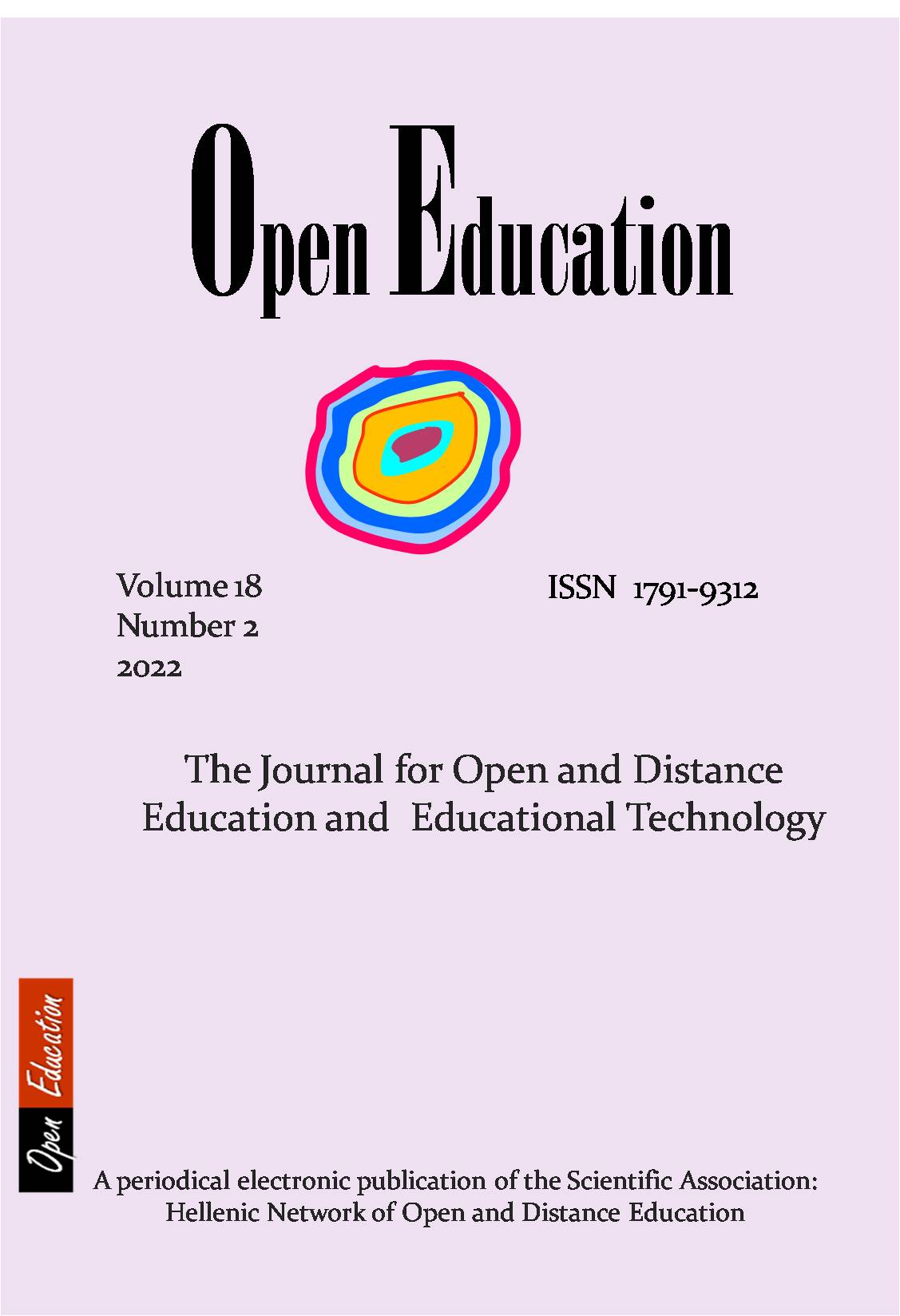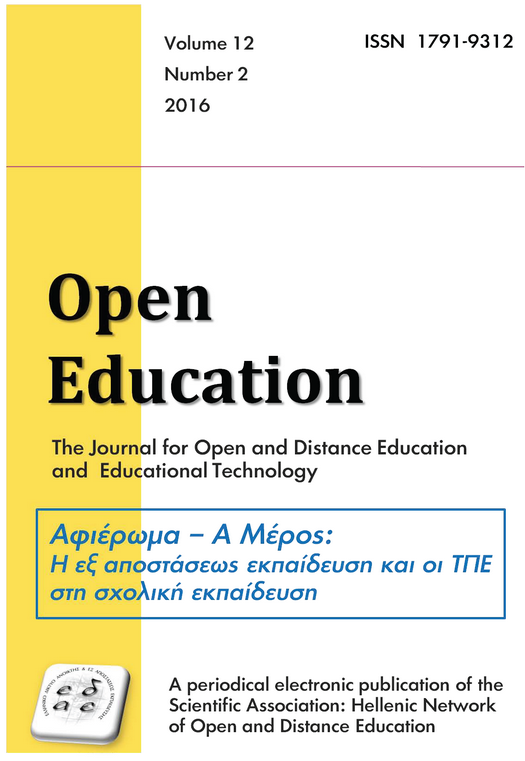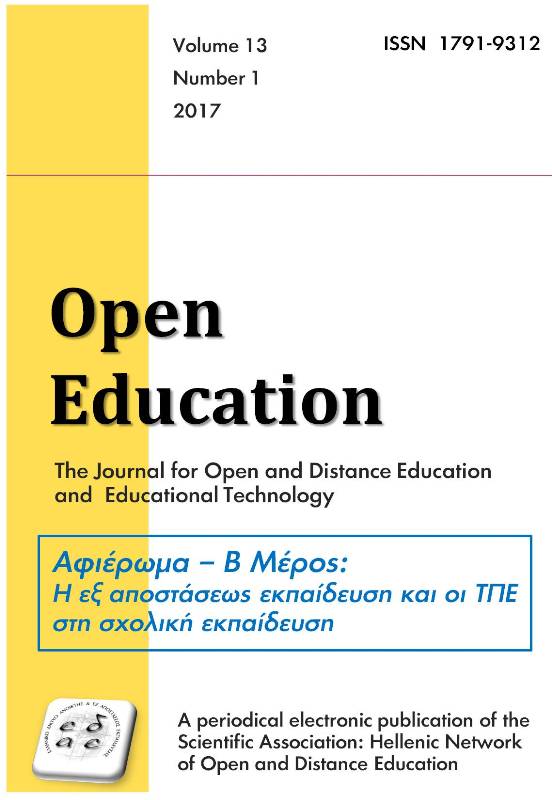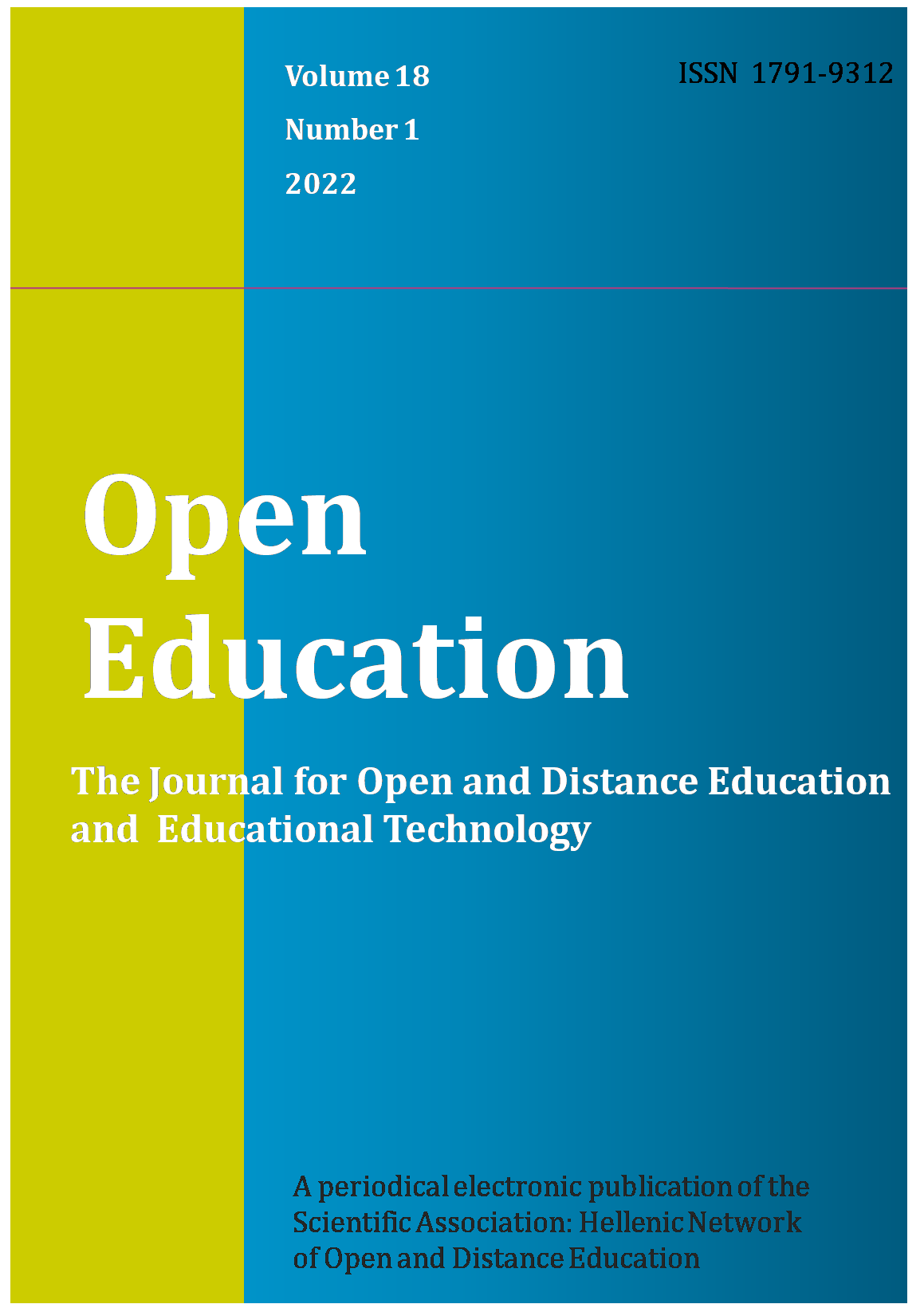The utilization of the online communication of the principals of primary education schools and its contribution to distance education in a period of pandemic crisis.
Abstract
The purpose of this work is to investigate the opinions and to record the proposals of the principals of primary education schools in the Prefectures of Attica, Viotia and Trikala regarding the degree of implementation of the T.P.E. in the school's communication with its external environment and its contribution to distance education during the pandemic period. In order to more fully investigate the purpose of this work, research questions are asked about the current situation regarding the technological equipment of the school units and the provision of continuous technical support, the effective use of ICT. with the aim of the best possible completion of the educational process and administrative function of the school, the degree and ways of utilization of ICT. regarding the modern remote communication of the school with its external environment.
The T.P.E. they are an integral part of the educational systems of most developed countries and their applications support both the educational process and the administrative function of school units (Mikropoulos, 2011͘͘͘͘; Kumar, 2008; Tsilis ·2018; Komis, 2004; Kordaki & Komis, 2000) . The multi-faceted, multi-level and dynamic effect of T.P.E. in the teaching and learning process, it concerns modern, polymorphic ways of searching and especially representing information, but also significant changes in the communication of all partners of the school community. Especially in recent years, but especially during the pandemic period, online communication was established with an emphasis on the immediate information of the participants. For example, parents are informed about changes in the timetable, absences, events.
The T.P.E. they are an integral part of the educational systems of most developed countries and their applications support both the educational process and the administrative function of school units (Mikropoulos, 2011͘͘͘͘; Kumar, 2008; Tsilis ·2018; Komis, 2004; Kordaki & Komis, 2000) . The multi-faceted, multi-level and dynamic effect of T.P.E. in the teaching and learning process, it concerns modern, polymorphic ways of searching and especially representing information, but also significant changes in the communication of all partners of the school community. Especially in recent years, but especially during the pandemic period, online communication was established with an emphasis on the immediate information of the participants. For example, parents are informed about changes in the timetable, absences, events.
The use of the internet and its applications in the operation of school units proved to be necessary and decisive during the pandemic period. This is because the above pandemic crisis led school organizations to adopt innovative strategies in real time without prior planning. In a short time, the central education administration was asked to adopt distance education since the school units were closed. Based on this strategy, students participated "in the educational process through virtual digital classrooms, which simulate all the characteristics of a modern educational environment..." (Tsifopoulos, 2020:57). That is, in "closed" schools but in "open" online classrooms, students' education continued (Zhou, Wu, Zhou, M. & Li, 2020).
It is important to underline that this forced remote application was firstly a communication application and secondarily an education one as in the first phase the emphasis was on communication and student support and gradually on teaching and learning. In particular, with regard to distance teaching and learning, it was a given that without trained teachers and appropriately designed educational material it could not be effective and qualitative (Lionarakis et al. 2021) and in no case could and should not be compared with living - traditional education, as we know it, with which teachers, students, parents have long experience and familiarity. In addition, the speed with which it was carried out highlighted the solidarity and fostered the mutual assistance of the teachers among themselves to manage the situation. On the other hand, dozens of online trainings were carried out very quickly with an impressively large participation of teachers who were anxious to find ways to cope with the difficult conditions (Manousou, Ioakeimidou, Papadimitriou & Hartofylaka, 2020). During the pandemic period it became clear that the immediate and rapid integration of ICTs was not an easy task at all. in the educational process as they needed systematic and immediate training, digital skills and teacher support, technological infrastructure, access, collaboration (Manousou, Ioakeimidou, Papadimitriou & Hartofylaka, 2020). The pandemic gave a big boost as everyone was forced to take advantage of ICT and especially online applications. Thus, teachers were forced to overcome some of the obstacles they faced when and if they tried to utilize ICT. (Buabeng-Andoh, 2012) in previous years.
The survey data was obtained through an anonymous written questionnaire in a convenience sample. The questionnaire was distributed by mail (conventional, electronic) to the principals of the primary education schools in three Prefectures of Greece, i.e. to 5.5% of the total Prefectures of the country. These are the prefectures of Attica, Boeotia and Trikala from which we received, during the period from April to November 2020, 102 questionnaires which were sufficiently completed and suitable for further statistical processing (64% response rate).
Questionnaires were analyzed using correlation tables with appropriate X2 controls, in order to determine if there were statistically significant differences in percentages between groups. Statistical significance levels α=0.05 (5%) were used for controls.
The existence and utilization of technological equipment in the operation of primary education school units in the Prefectures of Attica, Viotia and Trikala and the way the managers of the specific units communicate with their external environment in a period of pandemic crisis, key points of reference around which they developed the opinions of the interviewed managers of primary education are considered to be among the main factors that influence the quality of the educational work provided by them. It is a given that the utilization of New Technologies (N.T.) in education can contribute both to the fulfillment of the pedagogical goals of the school units and to the more efficient exercise of the administrative function of these units.
Taking into account the results of this research and recognizing that one of the goals of the educational system is the effective utilization of New Technologies both in fulfilling the pedagogical goal and in the more efficient administrative functioning of the school, they create conditions for facilitating the work of the managers of of school units of primary education. However, the identification of some weaknesses from the analysis of the data (e.g. lack of modern technological equipment in many schools that participated in our research, the insufficient training of a significant percentage (46%) of managers in the use of ICT etc. .a.) is a challenge but also a request both for the satisfaction of the operational needs of the school units, in normal and abnormal (e.g. during a pandemic crisis) working conditions and for the best possible utilization of the available technological means by the school units so that education contributes more to the social and economic development of the country (Schultz, 1972; Psaharopoulos, 1999; Saiti, 2000; Skoundzos, 2005). Education, after all, remains the most important factor in the production and formation of personalities, competent professionals, free and aware citizens. Especially today, when our country is going through a period of pandemic crisis and economic difficulties, the effectiveness of educational units is an imperative need.
In this light, the competent state body is called upon in the context of a developmental and evolutionary educational policy, to accept that the realization of the goals of education requires a careful analysis of the needs of the managers and also of the school units, in order to ensure the effective and efficient implementation of T.P.E. to the school administration through a series of parameters such as the provision of an organized training/training program for managers in matters of utilizing specific technologies in the administrative process, the supply of modern technological equipment for all schools in the country, the provision of technical support for the equipment, etc. , in order to lay the foundations for the quality upgrade of the administrative process of the schools and, by extension, the improvement of the educational system.
In conclusion, we note that the present research is subject to limitations mainly due to the sample which is not nationwide. For this reason, relevant future research could include in the sample managers from more educational regions of the country, examining differences between urban and semi-urban regions, levels of education and type of school (e.g. music schools, special education schools, etc. a.) Additionally, as managers are not a homogeneous group (Bartell, 2005) but are expressed differently not only according to age, years of service or gender, but also their experiences from school years, the type of their academics studies, the size and type of school they run, these elements could be taken into account in relevant research in the future. Finally, taking into account the crucial role of ICTs. in the operation of a school unit and the limited application of ICT. from a significant number of primary school managers that this study demonstrated for the school's communication with the external environment in a period of pandemic crisis, it is proposed to investigate (a) the correlation of the existing technological equipment and the application of ICT. in the school units and (b) the factors that would make the managers more positive in the utilization of ICT. in the administrative process of their schools.
Article Details
- How to Cite
-
Ρογάρη Γ. Π., Γώγος Κ., Προκοπιάδου Γ., Μανούσου Ε., & Κύρου Φ. (2022). The utilization of the online communication of the principals of primary education schools and its contribution to distance education in a period of pandemic crisis. Open Education: The Journal for Open and Distance Education and Educational Technology, 18(2), 158–181. Retrieved from https://ejournals.epublishing.ekt.gr/index.php/openjournal/article/view/31194
- Section
- Section 1

This work is licensed under a Creative Commons Attribution-NonCommercial-ShareAlike 4.0 International License.
Copyright Notice
Authors who publish with this journal agree to the following terms:
Authors retain copyright and grant the journal right of first publication with the work simultaneously licensed under a Creative Commons Attribution Non-Commercial License that allows others to share the work with an acknowledgement of the work's authorship and initial publication in this journal.
Authors are able to enter into separate, additional contractual arrangements for the non-exclusive distribution of the journal's published version of the work (e.g. post it to an institutional repository or publish it in a book), with an acknowledgement of its initial publication in this journal.
Authors are permitted and encouraged to post their work online (preferably in institutional repositories or on their website) prior to and during the submission process, as it can lead to productive exchanges, as well as earlier and greater citation of published work.






